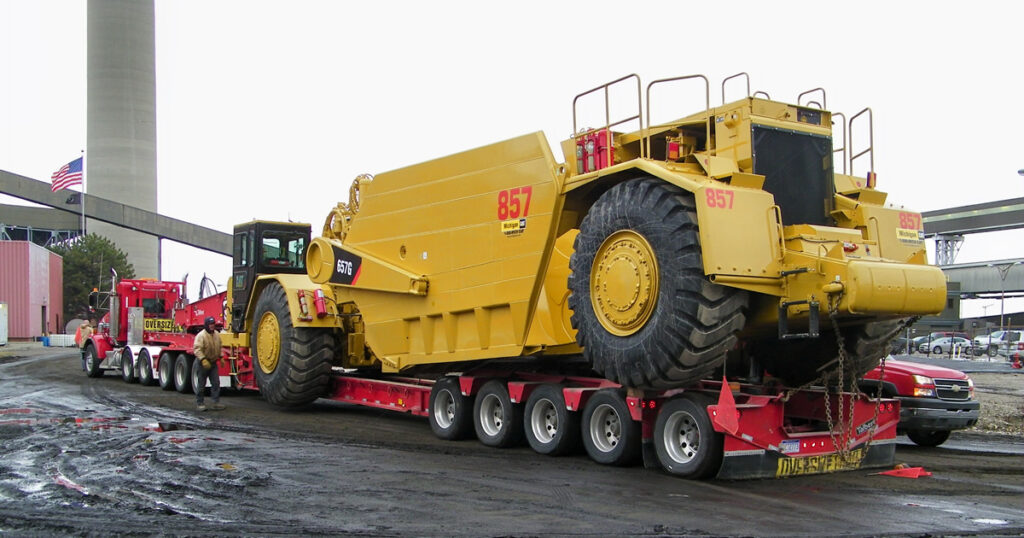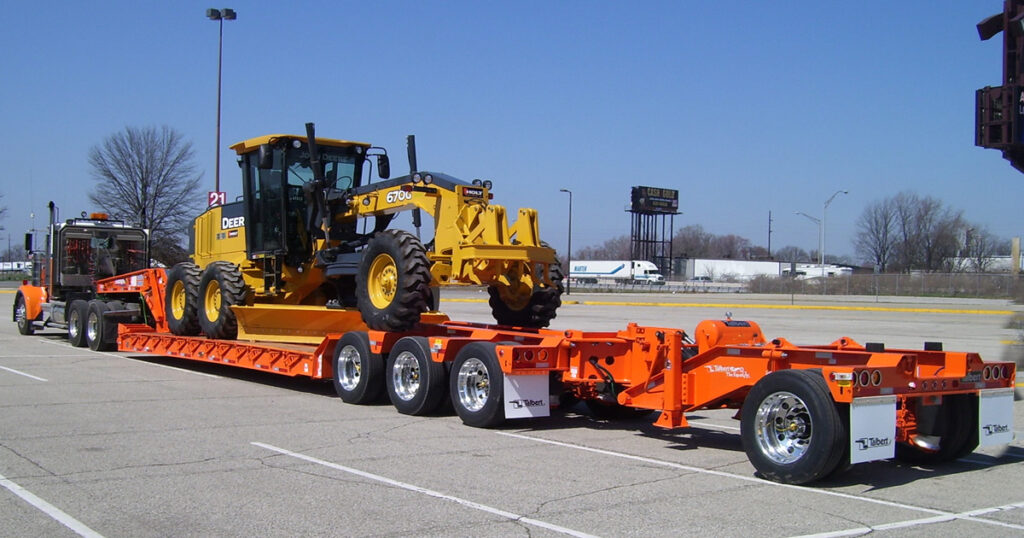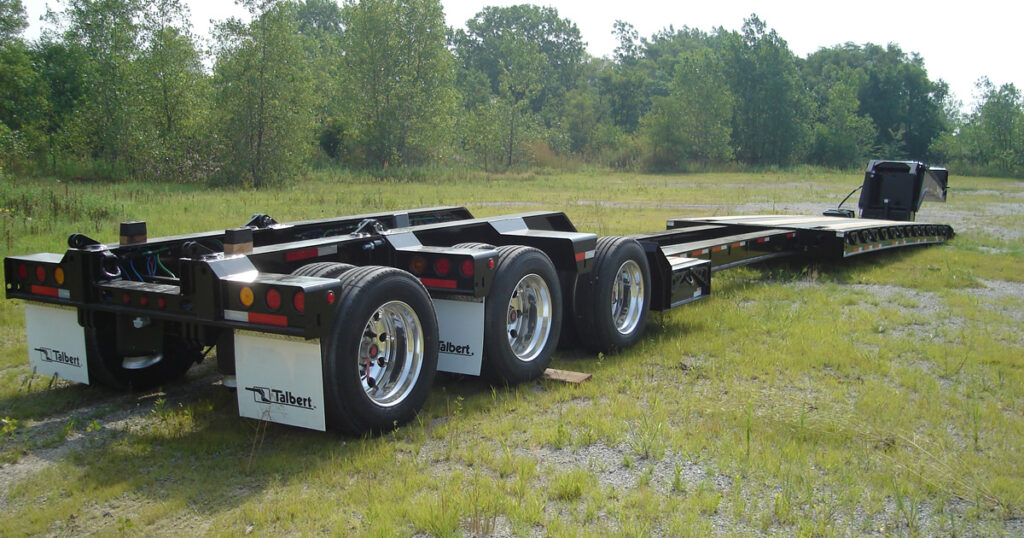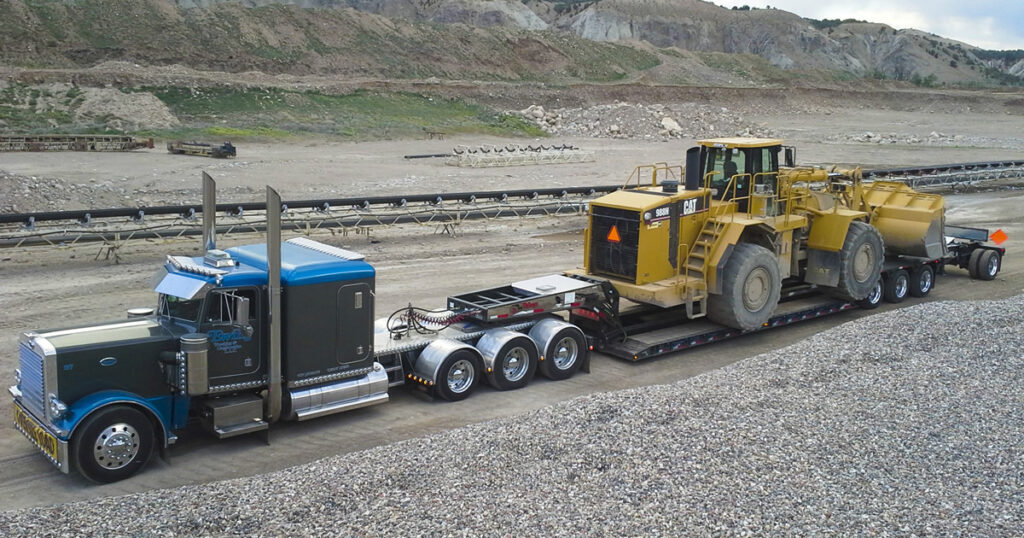Home » Trailer Industry » Misc Information » Heavy-Haul Trailer Selection FAQ

Heavy-Haul Questions
Expert Answers to Common Queries
By Troy Geisler, vice president of sales and marketing, Talbert Manufacturing
Hauling is a complicated process. To maximize efficiency and minimize costs, operators rely on manufacturers and dealers to help identify the right trailer to fit their unique hauling needs — one with the capacity and features to legally and safely transport the intended load.
To select the right trailer, dealers, manufacturers and operators will ask a lot of questions. Knowing the answers to some of these ahead of time speeds up the process, so we’ve collected answers to common heavy-haul questions.

How Does Capacity Factor In?
In a perfect world, a 55-ton trailer would be capable of hauling any 55-ton load. However, any veteran operator will tell you that’s just not the case.
Load concentration is a key area of difference between industry leaders and other manufacturers in questions of capacity. It’s not enough to know a 55-ton lowbed can carry 55 tons. Informed operators also know just how much of the deck can handle that weight based on the manufacturer’s capacity rating. While some trailers will need the entire deck length to haul 55 tons safely, a trailer from another manufacturer might only need half the deck length for the same weight. Having a trailer rated in half deck capacity gives operators a more realistic indication of what the trailer will be able to handle safely and without structural failure. These manufacturers usually design with a two-point rigid load base that accounts for the tire spacing — or hot spots — of large equipment and heavy machinery. This makes trailers with a half-deck rating more versatile and efficient for these loads.
There is no one size fits all when it comes to trailers. For safety and dependability, partnering with a trusted dealer and top-tier manufacturer ensures operators are outfitted with the trailer that meets their individual requirements. In some cases, that might mean a custom design. Not all manufacturers provide this service, but some industry-leading companies will design and build a customized trailer that maximizes safety, durability and resale value.

What Specialty Features are Important?
When looking at the price tags, it’s common for operators to ask what added value makes a top-tier manufacturer’s trailer worth the cost over other models. Depending on the intended use, certain specialty features, like a hydraulic beaver tail or in-deck winch, may be unnecessary. Others are vital for safety, durability and productivity.
When evaluating the added value of specialty features, start with the basic materials. Industry-leading manufacturers use high-quality materials like steel with 100,000 psi minimum yield, which allows the most capacity with the smallest impact on trailer weight. They also use apitong decking to provide the toughest, longest-lasting decks. These features come with a higher price tag, but quickly pay for themselves in increased efficiency and durability.
Other design features might be less obvious in the dealer lot but make a clear difference with the first load. Perhaps the most misunderstood of these is camber. Camber is the term used to describe the arc that forms in the center of a well-designed trailer. It helps prevent excessive deflection in the main beams. When properly loaded to capacity, the arc will flatten, resulting in the trailer’s loaded deck height. A top-tier manufacturer can adjust camber in custom designs to meet the operator’s specific needs, but in general, a trailer that presents a slight upward arc in the center has positive camber which will flatten with a full load.
In addition to high-quality materials and special in-trailer design features, trusted manufacturers might also have a catalog of optional add-ons that allow operators to maximize their capacity and potential. For example, some offer deck extensions made from the same quality materials for a perfect fit. Nitrogen dampened axle extensions with a self-tracking pivot design that allows for consistent load transfer even over uneven terrain might be another desirable option.
When is a Permit Required?
Permits are another area of heavy-haul that can cause frustration for operators. Dealers and manufacturers are constantly bombarded with questions like, “What permits do I need to haul X through states Y and Z?”
Unfortunately, there is no easy answer. That’s why the intended area of operation is almost as important as capacity when selecting a trailer. Dealers, manufacturers and industry associations, such as the Specialized Carrier and Rigging Association (SCRA), have a wealth of information on this subject that they are willing to share with operators and managers, but operators are encouraged to submit a configuration to states they plan to operate in to ensure proper permitting.

What is Overloaded?
Safety is a core value of many of heavy-haul’s top-tier manufacturers. That is why they work with dealers, managers and operators to find the right trailer. It’s why they hold themselves to a higher standard with capacity ratings. And it’s why they do their best to help operators determine what permits might be required for an oversize load. Top-tier manufacturers are concerned with the safety of operators, equipment and the payload, but also those sharing the road. For that reason, they highly discourage overloads. A single overload might not cause the trailer to fail, but it reduces the manufacturer’s safety factors and puts unnecessary stress on the trailer components, putting it at risk of future failure.
It is also inadvisable to add aftermarket elements to a trailer to try to increase capacity. Adding more axles, a spreader bar, a jeep or any other element to a trailer that it was not designed for does increases the span but does not add capacity to that trailer. In some cases, it will reduce the load rating of the trailer. If not designed for the trailer, adding aftermarket pieces can create stress and lead to failure.
While simply adding axles and extenders cannot increase the capacity of a trailer, that type of versatility can sometimes be designed in. Certain top-tier manufacturers are capable of designing trailers that have a rating such as 55 tons in a spread axle setting then can increase to 60 ton with a close-coupled one.
Who Can Help Answer My Questions?
In an industry where so much is riding on what operators choose to run between the road and the load, taking the time to work through the easy and the difficult questions with experienced dealers and manufacturers ensures everyone’s safety and the trailer’s dependability and longevity as drivers hit the highway.
About Talbert Manufacturing
Talbert has been building world-class heavy-haul and specialized trailers to rigorous customer specifications since 1938. The company offers complete lines of heavy-haul trailers and specialized transportation equipment for the commercial, industrial, military and government sectors. Its trailers and equipment are used in applications as diverse as renewable energy, aerospace, heavy construction, in-plant material handling, manufacturing and processing systems and much more. More information: Talbert Manufacturing, 1628 W. State Road 114, Rensselaer, IN 47978; 800-348-5232; sales@talbertmfg.com; www.talbertmfg.com, Facebook or LinkedIn.
About the Author
Troy Geisler is the vice president of sales and marketing for Talbert Manufacturing. He has more than 15 years of experience in trailer sales, including more than five years with Talbert. Troy earned his bachelor’s degree from Purdue University in West Lafayette, Indiana.
